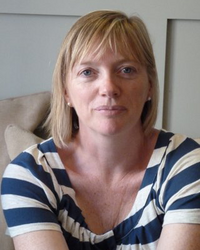
Sharon O'Brien is a senior lecturer in translation and language technology at the School of Applied Language and Intercultural Studies, Dublin City University. Her research to date has focused on the interaction between translators and technology (including Translation Memory and Machine Translation), cognitive aspects of translation, research methods, including eye tracking and keyboard logging, localisation, and content authoring. She is Director of the Centre for Translation and Textual Studies (www.ctts.dcu.ie) and a funded investigator at the cross-institutional research centre Adapt (www.cngl.ie). She previously worked as a language technology specialist in the localisation industry. Recent publications include Research Methodologies in Translation Studies (with Gabriela Saldanha, University of Birmingham) and Interdisciplinarity in Translation and Interpreting Process Research (forthcoming 2015 – co-edited with Maureen Ehrensberger-Dow and Susanne Göpferich).
Sharon O’Brien, PhD, School of Applied Language and Intercultural Studies, Centre for Translation and Textual Studies, Adapt research centre, Dublin City University, Ireland; Sharon.obrien@dcu.ie
Shifting paradigms in translation technology and their impact on translation (studies)
The introduction of translation memory tools in the early 90s represented a significant development in the translation profession at that time. Arguably, not much else changed for many years from a translation technology perspective. However, the recent increase in machine translation (MT) utilisation has perhaps unsettled the foundations once again. TM tools now incorporate MT, with the result that the lines between the two technologies and between ‘post-editing’ and ‘revision of TM matches’ are becoming blurred. Machine Translation is merged with Human Translation in a Translation Memory, which is then used to ‘train’ the MT system. We encounter concepts such as ‘Human-Assisted-Machine Translation’ and ‘Human-in-the-Loop’, where the human helps the machine, which contrast somewhat with ‘Computer-Aided Translation’ or ‘Machine-Assisted-Human Translation’ where the machine aids the human. At the same time, in the technical communication profession, concepts such as intelligent and personalised machine-consumable content are emerging. This talk will consider these shifting paradigms and their potential impact on translation (studies).